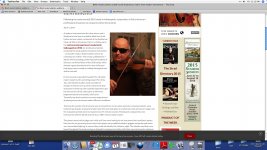I would not worry about it, dvv. It reminds me of acoustical guitar popularity, that peaked in the USA in the 1960's where just about everybody and his brother had a guitar, different quality guitars were available, and the best guitars were obviously better sounding than most others. When popular music went almost all electric, the acoustical guitar stores often closed shop, BUT people still heard the differences between acoustic guitars, even IF most didn't worry about it.
One problem with the double blind test is: That it seems to obscure what was previously, obvious differences, during the test, BUT then the differences returned in further open testing. Of course, we can all be 'fools' but I don't think so.
One problem with the double blind test is: That it seems to obscure what was previously, obvious differences, during the test, BUT then the differences returned in further open testing. Of course, we can all be 'fools' but I don't think so.
And with that, it's not worth exploring..?? Maybe you don't trust your ears and don't detect differences , but human perception is not universal, like not all people are able to sing, to find the tone, pitch and rytm, yet some can talk to you in ways that make you cry.
Some people have skills beyond comprehension. Making and designing speakers make me very aware that it takes more than numbers to understand the complex interface between amplifier and human perception. I can make a speaker flat and terrible or curvy and wonderful, How should it be, what is right, how do you put that in numbers..??
Neglecting that people can hear differcies is an insult to people. The business should be about conwaying emotion and bringing joy to people, reducing the audience to a group that can't hear and decriminate is both arrogant and narrow minded.
Some people have skills beyond comprehension. Making and designing speakers make me very aware that it takes more than numbers to understand the complex interface between amplifier and human perception. I can make a speaker flat and terrible or curvy and wonderful, How should it be, what is right, how do you put that in numbers..??
Neglecting that people can hear differcies is an insult to people. The business should be about conwaying emotion and bringing joy to people, reducing the audience to a group that can't hear and decriminate is both arrogant and narrow minded.
Neglecting that people can hear differcies is an insult to people.
If that were true, yes. But no-one has ever said that.
One problem with the double blind test is: That it seems to obscure what was previously, obvious differences, during the test, BUT then the differences returned in further open testing.
Yes, peeking makes identification much more reliable. But some of us, who aren't promoting a narrative for profit, actually trust our ears.
What made Stradivarius able to make such fabulous violins, Ohh I know he had an amazing measurement lab.. or maybe he could just hear his way forward. ??
If he made amplifiers, then yes, he would have needed one. Unless he was catering to the niche fashion market, in which case his amps could be absolutely dreadful as long as there was a good story attached to them.
.. Again I'am sad to see that when we talk about speaker/amplifier interface, all the big guys go completely silent. Fact is that nobody really knows what goes on how the amplifier delivers current to speaker, how much that current is bloated by counter current, how nonlinear that current is and Why, How it affects the feedback. Does it develop voltage over the output impedance and is that feed into the feedback...
have you really read the lit, know even the basics of Bode Sensitivity analysis?
these things are well known to feedback amp designers who care to look, use the very complete theory and verify with over 18 bit "perfect" ADC in affordable prosumer sound cards, much less pro equipment like recent AP analyzers
its just that many naive subjectivists don't like the results - along with those of actual Blinded controlled listening tests
the electric/electronic signal controlling physics and EE isn't that hard to follow to known limits of human auditory resolution
sound radiation is also well understood physics
the loudspeaker is the major source of sound uncertainty - but still no new or missing physics - its all in the messy multiphysics of real complex materials and geometry
but uncertain, nonlinear electric loads on the order of multiway dynamic loudspeakers interaction with audio power amps are really not a challenge to understand
the "big guys" interest is no longer a limitation - some of the few serious hobbyists left are already equipped to add a few zeros to published audio amp design papers results from the 70s-80s JAES
the recent "current drive" and series Z discussion had measured results popping up in hours with advanced hobbyist level of equipment
but the audiophool's verities that disappear under controlled scrutiny are unlikely to ever be "understood" to their satisfaction
It gets tiresome to be continually insulted by 'know it alls' about what I can and can't hear.
I'm confident about your ability to read nameplates. Me, I use my ears and listen instead of peeking when I'm doing evaluations. But admittedly I'm not trying to differentiate a commercial product.
Yup! Have you ever heard an outstanding Strad, when you did not know what it was? I have.
Yes. The guy playing it could have made anything sound great.
Interestingly, when we did a wine tasting, the violinist wanted to do it blind. He was pretty good at identifying the vineyards.
In either case, the blind test nullifies the differences.
No, it doesn't. You might want to reread the paper- the fact that differences were heard is in the lead sentence, so I'm a bit surprised you missed it. Peeking is allowed for the re-read.
I don't see the correlation between hifi (transparent sound reproduction) and violin makers (instruments that *create* sounds).
There is, actually. The term of interest is "hedonic testing."
What is sometimes lost I think on all of us, some more, some less, that over time the instruments used to make music with have also changed. A 70 year old Steinway will definitely sound different to a modern grand piano made by some obscure company, but this difference may be more or less pleasing to us. Upon hearing it, we may question the quality of playback simply because our own reference is something else. We end up, like it or not, also selecting which of the two sounds we really prefer. Yet both may be extremely faithfully reproduced.
Te example John posted shows just such a case.
Te example John posted shows just such a case.
- Status
- Not open for further replies.
- Home
- Member Areas
- The Lounge
- John Curl's Blowtorch preamplifier part II

